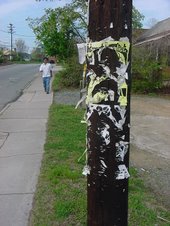
Chapel Hill Herald
Saturday April 13, 2002
Page 1
By RAY GRONBERG
CHAPEL HILL - A West Rosemary Street record store owner wants the Town Council to repeal Chapel Hill's oft-ignored ban on posting flyers and signs on telephone poles.
Erik Ose says the 41-year-old law is an impediment to free speech that harms political groups and small businesses that can't afford newspaper and broadcast advertising.
Efforts to enforce the ban are a waste of money and undercut Chapel Hill's college-town image, he adds.
"It is a judgment call, but, personally, I feel a telephone pole covered with colorful, exciting, diverse posters looks better than cold, barren poles covered with staples and jagged pieces of paper," Ose said. "That's the kind of Chapel Hill I want to live in, not one where posters are treated like a scourge to be torn down and destroyed."
Ose appeared before the Town Council on Monday to ask members to consider a repeal measure and has since launched a petition drive to gather public support. He said more than 200 people have signed.
Council members relayed Ose's request to Town Manager Cal Horton, who will report back with research and advice later this spring.
Ose launched his repeal drive after a Chapel Hill police sergeant ticketed him on April 4 for attaching a flyer to a pole near the Franklin Street post office.
The flyer advertised a "banquet for global peace and justice" later that night in Carrboro that ended up raising $2,500 for a variety of social justice causes, said Ose, who runs Lost City Music & Video.
A police officer saw Ose stapling a flyer to the pole and asked him to take it down. Ose refused.
"I said I was sorry, I couldn't do that, because I didn't think it was a just ordinance," he recalled.
The officer summoned his sergeant, Anthony Brooks, who issued the ticket when Ose again refused to remove the flyer. The ticket charged him with placing a sign or notice on a utility pole in violation of a city ordinance.
It was referring to section 16-3 of the Town Code, which says "no signs or notices for advertising purposes shall be fastened or tacked to telephone, telegraph or electric light poles or trees on the streets or sidewalks."
Both officers were courteous, professional and surprised that someone was willing to spend time fighting the ordinance, said Ose, who added that he intends to contest the ticket in court on May 20.
The flyer ban is one of the most widely flouted ordinances in town, as a glance at any phone pole along Franklin and Rosemary streets would show. Ose is among the dozens of people who post announcements on them each day.
Many advertise political causes, but others promote businesses and concerts.
Town officials are just as energetic about removing them. The Public Works Department dispatches a landscaper each Sunday to strip flyers from phone poles and kiosks.
Postings in the kiosks are legal.
"We'd much rather that they be put there than stuck up on telephone poles or buildings," said Harv Howard, solid-waste services superintendent, who added that removal drives also precede major weekend events and festivals.
The town ordinarily maintains five kiosks, but it's been getting by with a couple less in recent years. Crews removed them during Streetscape sidewalk work.
Officials do intend to replace them - and the wooden kiosks that still remain elsewhere along Franklin Street - with steel-framed models designed to look better and stand up to vandals.
A public works crew will install the first steel kiosk next week on North Columbia Street, said Curtis Brooks, the town's urban forester.
The steel kiosks are being built by a Durham fabricator who charged the town $950 for the first one.
"If, as we anticipate, people feel it's an improvement over the older ones, we'll go ahead with the other five," Brooks said.
But while Ose said more kiosks are welcome, he still thinks the council should repeal the flier ban.
"The utility poles exist," he said. "What else are they really used for? They're a natural venue for free speech."
Ose's challenge to the flyer ban comes as officials are considering changes to another section of town law that also regulates signs.
The review - and a parallel enforcement suspension - began following September's "Woe to Our Enemies" flap involving East Franklin Street restaurant owner Scott Maitland and the town's Inspections Department.
Inspectors made Maitland take down a banner expressing his views on the Sept. 11 terrorist attacks.
They said it was too large, but the order drew fierce protests because it came while three council members were in the process of complaining to Horton about the banner's message.
Officials subsequently agreed that parts of the sign law are vulnerable to challenge, and are in the process of scheduling a hearing to gather advice on how to change it.
The president of the American Civil Liberties Union's Chapel Hill-Carrboro chapter, Mark Dorosin, said the flyer ban might raise similar issues.
While court cases say local governments can impose reasonable "time, place and manner" restrictions on speech, they frown on any attempt to regulate content.
Since the flyer ban refers specifically to advertising, its wording could signal a content restriction, Dorosin said.
The code has one other potential problem, because it allows Horton to waive the posting ban for "temporary signs."
"What does that mean, and what is he basing that exercise of discretion on? If it's content based, it's constitutionally suspect," Dorosin said. "Anything that creates a content-based restriction, where the problem is the message rather than the form the message is being delivered in, I would say creates First Amendment problems at the least."











